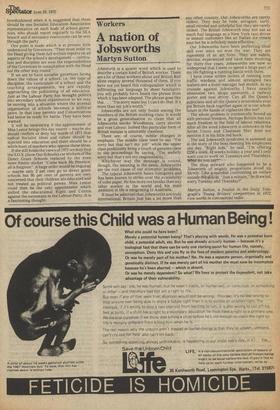A nation of Jobsworths
Martyn Sutton
Jobsworth is a quaint word which is used to describe a certain kind of British worker. There are a lot of these workers about and British Rail alone employ several thousand of them. If you have not yet heard this colloquialism which is infiltrating our language by sheer familiarity you will probably have heard the phrase from which it has been adapted. The phrase goes like this . . . "I'm sorry mate but I can't do that. It's more than my job's worth."
Jobsworths are not only found among the members of the British working class. It would be a gross generalisation to claim that all Jobsworths smoke Woodbines, carry shovels and vote Labour. Indeed this particular form of British malaise is admirably classless.
There are, of course, subtle changes in emphasis. The middle class tend to say "I'm sorry but that isn't my job" while the upper class predictably bring a touch of genuine class to the proceedings by saying, -I'm awfully sorry but that's not my responsibility."
Whichever way the message is voiced, though, the meaning is the same. Jobsworths are the root cause of our economic problems.
The typical Jobsworth hates foreigners and has been known to strike over the availability of toilet paper. He has more tea breaks than any other worker in the world and his main ambition in life is emigrating to Australia.
It must be admitted that Jobsworths are truly international. Britain just has a lot more than any other country. Our Jobsworths are rarely violent. They may be rude, arrogant, surly, small minded and unhelpful but they are rarely violent. The British Jobsworth may not use as much foul language as a New York taxi driver or assault customers like an Italian ice cream man but he is infinitely more effective.
Our Jobsworths have been perfecting their skill ever since we won the war. They are exponents of an art form. They are subtle, devious, experienced and have been evolving for thirty-five years. Jobsworths are now so widespread that I seem to spend a large part of my life fighting a running battle with them.
I have come within inches of running over traffic wardens and almost strangled two waiters and a hotel manager last month. In my crusade against Jobworths I have nearly eliminated two shops assistants, a railway porter and taxi driver. Can all the Queen's politicians and all the Queen's economists ever put Britain back together again or is our whole future in the hands of vigilantes like me?
The whole problem is intrinsically bound up with personal freedom. Perhaps Britain has too much freedom in the field of labour relations. After all the word Jobsworth is unknown in the Soviet Union and Chairman Mao does not mention it in his little red book.
The-sad Jobsworth syndrome is summed up in the story of the boss meeting his employees one day. "Right lads," he said, "I'm offering £250 a week, 42 weeks holiday a year and I only want you to work on Tuesdays and Thursdays. Wt do you say?"
The shop steward who happened to be a Jobsworth of mighty proportions stood up. Slowly. Like a marshal confronting an outlaw outside the saloon. "Just a minute," he drawled, every Tuesday and Thursday!"
Martyn Sutton, a finalist in the Daily Telegraph's 'Young Writers' competition in 1972, row works in commercial radio


































 Previous page
Previous page